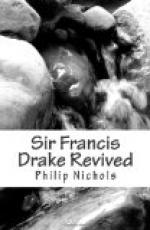Thus having parted (23rd July) from our company: we arrived at the island of Cativaas, being twenty-five leagues distant, about five days afterward (28th July). There we landed all in the morning betimes: and our Captain trained his men, delivering them their several weapons and arms which hitherto he had kept very fair and safe in good caske [casks]: and exhorting them after his manner, he declared “the greatness of the hope of good things that was there! the weakness of the town, being unwalled! and the hope he had of prevailing to recompense his wrongs! especially now that he should come with such a crew, who were like-minded with himself; and at such a time, as he should be utterly undiscovered.”
Therefore, even that afternoon, he causeth us to set sail for Nombre de Dios, so that before sunset we were as far as Rio Francisco. Thence, he led us hard aboard the shore, that we might not be descried of the Watch House, until that being come within two leagues of the point of the bay, he caused us to strike a hull, and cast our grappers [grappling irons], riding so until it was dark night.
Then we weighed again, and set sail, rowing hard aboard the shore, with as much silence as we could, till we recovered the point of the harbour under the high land. There, we stayed, all silent; purposing to attempt the town in the dawning of the day: after that we had reposed ourselves, for a while.
But our captain with some other of his best men, finding that our people were talking of the greatness of the town, and what their strength might be; especially by the report of the Negroes that we took at the Isle of Pinos: thought it best to put these conceits out of their heads, and therefore to take the opportunity of the rising of the moon that night, persuading them that “it was the day dawning.” By this occasion we were at the town a large hour sooner than first was purposed. For we arrived there by three of the clock after midnight. At that time it fortuned that a ship of Spain, of 60 tons, laden with Canary wines and other commodities, which had but lately come into the bay; and had not yet furled her spirit-sail (espying our four pinnaces, being an extraordinary number, and those rowing with many oars) sent away her gundeloe [? gondola] towards the town, to give warning. But our Captain perceiving it, cut betwixt her and the town, forcing her to go to the other side of the bay: whereby we landed without impeachment, although we found one gunner upon the Platform [battery] in the very place where we landed; being a sandy place and no key [quay] at all, not past twenty yards from the houses.
There we found six great pieces of brass ordinance, mounted upon their carriages, some Demy, some Whole-Culvering.
We presently dismounted them. The gunner fled. The town took alarm (being very ready thereto, by reason of their often disquieting by their near neighbours the Cimaroons); as we perceived, not only by the noise and cries of the people, but by the bell ringing out, and drums running up and down the town.




